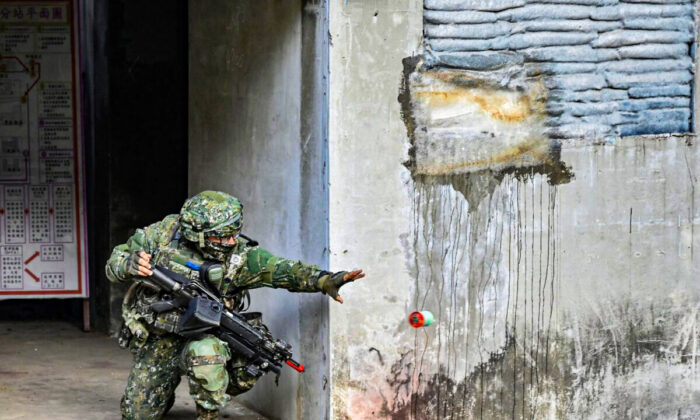The Russian invasion of Ukraine demonstrated the failure of strategic ambiguity, according to one former defense official, who said that the war would have profound implications for Chinese Communist Party (CCP) efforts to forcibly unify Taiwan with the mainland.
“I think it should be the declarative policy, it should be a stated policy of the United States government that it will defend Taiwan if China attacks Taiwan,” said former Deputy Undersecretary of the Navy Seth Cropsey during a recent interview with EpochTV’s “China Insider” program.
“And, after stating that, I think it’s important that the United States make good on its word.”
Strategic ambiguity, the doctrine that the United States should not clarify whether it would or would not militarily defend Taiwan in the event of a conflict, has come under increasing fire of late, as fears have grown that the CCP is preparing to invade.
CCP leadership maintains that Taiwan is a breakaway province, though Taiwan has been self-governed since 1949 and has never been controlled by the CCP.
Cropsey said that ambiguity failed to deter Russia from invading Ukraine, and that a stronger stance was necessary to prevent the same from happening in Taiwan.
“This so-called strategic ambiguity [that really means] we won’t support Taiwan if it’s attacked, it’s not helpful,” Cropsey said. “It doesn’t deter China. It risks the safety of Taiwan, and I think it would be a good idea if the United States were to rethink that.”
Cropsey said that the Biden administration had plenty to be concerned about in crafting its China strategy. From IP theft to the arming of artificial islands to debt diplomacy and military modernization, the CCP is on the march. Unfortunately, he said, the United States’ policy on Taiwan was not adapting.
“I don’t think it’s changed a great deal since the Trump administration in fact,” Cropsey said of Sino-American relations.
“U.S. policy toward Taiwan remains unchanged. It’s been this way now [for] 41 years, there’s no change there.”
U.S.-China relations have continued to bottom out in recent months, as national leaders have expressed fears that the United States is ceding influence and power in the western Pacific. Some 82 percent of Americans now view China unfavorably, and the House of Representatives has gone so far as to pass legislation that would condemn the Chinese communist regime for complicity in Russia’s alleged war crimes in Ukraine.
Indeed, the Sino-Russian bloc against the West has grown so tight now that one expert warned China would continue to support Russia even if the latter used nuclear weapons in Ukraine. It is a grim possibility, but one that Cropsey believed the West would respond to with sanctions.
“If the Russians use tactical nuclear weapons or a tactical nuclear weapon in Ukraine, and China supports it or provides any kind of material or military support to Russia after such an event, I expect that there will be economic sanctions against China,” Cropsey said.
In all, however, Cropsey said that one of the greatest threats to stability in the Pacific, and to Taiwan in particular, was the United States’ apparent lack of any coherent military strategy to contend with an invasion.
“There is the larger question, which is, what would the strategy be if the United States found itself in a conflict with China, caused by a Chinese invasion of Taiwan,” Cropsey said. “You need a plan, some kind of plan. How do you respond to that? And the Navy doesn’t have that in place. The United States doesn’t have that in place or, if it does, it’s a secret.”
“The conflict in Ukraine has very important significance for our relationship, the United States’ relationship with Taiwan,” Cropsey added. “One of the clearest lessons from the Russian invasion of Ukraine is that you don’t wait until the invasion actually happens to help deter it or prevent it or make sure that the friend, ally, or partner is able to defend themselves.”
The Epoch Times has reached out to the Pentagon for comment.
https://www.theepochtimes.com/you-need-a-plan-former-defense-official-calls-for-end-to-us-strategic-ambiguity-on-taiwan_4437105.html

No comments:
Post a Comment